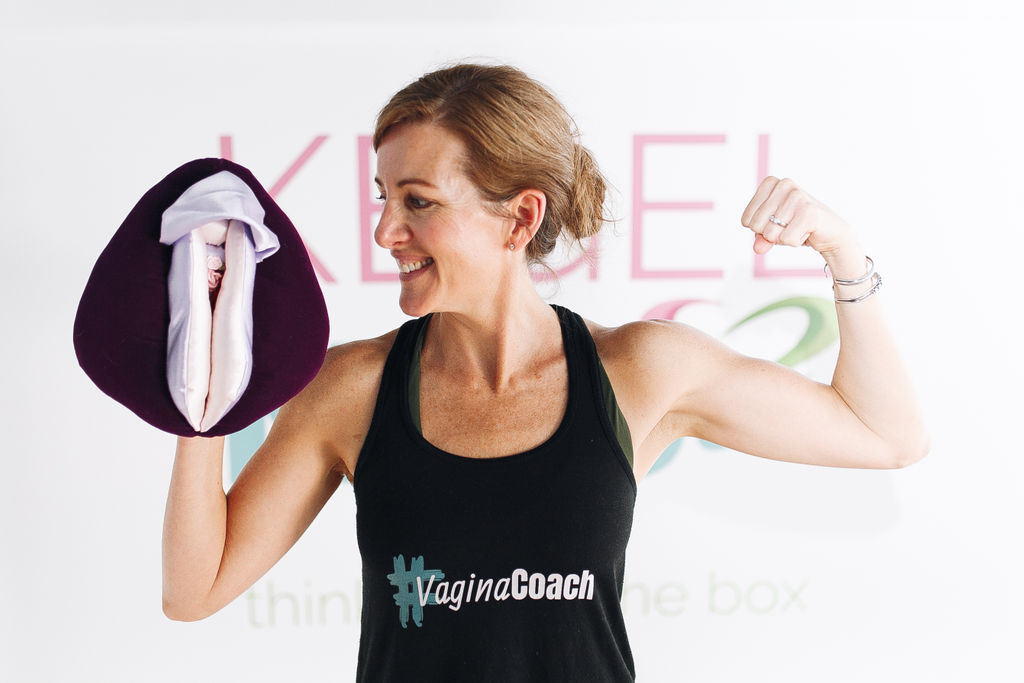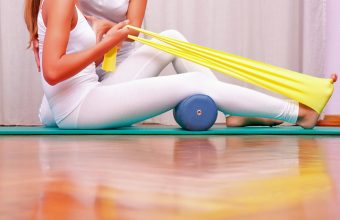If you pee when you jump or laugh, you might need a Vagina Coach! Yes, that’s a thing…
Kegels, Pelvic Floor Health with the Vagina Coach
If you pee when you jump or laugh, that’s incontinence. Incontinence is a sensitive condition that affects close to 40% of women and an estimated 400 million people worldwide. While incontinence is largely considered to be an older woman issue, it also affects young athletes, CrossFit enthusiasts, and even men. June 20 – 26 is World Continence Week, a worldwide health campaign to raise awareness of incontinence related issues. Continence and pelvic floor health can be taboo topics, so we turned to the expert, Kim Vopni – the Vagina Coach.

Kim’s a pelvic floor specialist and certified fitness trainer specializing in pre- and post-natal health, perimenopause, and menopause. She is also a speaker, author, and advocate for increasing awareness on pelvic health.
What is the pelvic floor?
Kim Vopni: The pelvic floor is the foundation of our core. It’s a group of muscles that close off the base of our pelvis. The pubic joint, the tailbone and the sitz bones act as the attachment points for these muscles which support organs, maintain and regulate continence and play a role in sexual response. The pelvic floor muscles keep the urethral opening, the vagina and the anus closed when we don’t want anything, like urine, gas, or stool to come out but they also need to relax and expand, for instance during childbirth.
What is incontinence? Is it not being able to stop pee when you jump?
Kim Vopni: Urinary incontinence is when urine leaks out of the body when you don’t want it to. Two common conditions are Stress Urinary Incontinence (SUI) – when muscles can’t react in time or with enough force to close the urethral opening and prevent urine leaking out. Urge Urinary Incontinence (UUI) is when you feel an overwhelming and sudden urge to urinate which can result in a bit of urine leaking out or a complete release of your bladder.
How did you get into vagina coaching?
Kim Vopni: After the birth of my first son, I recognized a huge need to educate women about pelvic health. I became a distributor for a product I had used in my birth prep called the EPI-NO. That introduced me to the world of pelvic health and I saw an opportunity to create a niche fitness business addressing pelvic floor health for women in pregnancy. I then started a second business Bellies Inc. to address postpartum recovery and as I moved in to perimenopause, I recognized that pelvic health is something we need to talk about at all life stages. I’m very passionate about educating women on the resources available as I understand the effect incontinence can have on one’s lifestyle.
Isn’t incontinence normal for women postpartum or as they head into old age?
Kim Vopni: It’s not normal. Media, movies, and the pad companies have tried to tell us incontinence is ‘just part of being a woman’ but that is not the case. Incontinence is common, many women suffer from it, especially during pregnancy, postpartum, and into menopause but it is not normal. There are so many lifestyle, dietary, exercise, and therapy treatments that can substantially improve, even reverse the condition.
How does pregnancy affect the pelvic floor?
Kim Vopni: During pregnancy, the weight on the pelvic floor muscles increases substantially. Posture and the center of gravity in the body shifts as the baby and belly grow which can also influence how the pelvic floor muscles work. Physical changes as well as hormones create stress on the pelvic floor muscles throughout pregnancy and then there is the birth itself. Both vaginal and caesarean births can result in a weakened pelvic floor. Recovery is so important so often overlooked. Early adoption of pelvic floor exercise postpartum helps to re-train the pelvic floor and continued progressions will strengthen the
muscles to help prevent recurrence.
Can pelvic floor health help women prepare for menopause as well as birth?
Kim Vopni: Menopause is a time of transition and can greatly influence the pelvic floor. Declining estrogen can trigger incontinence or exacerbate existing incontinence and can also contribute to thinning of the tissue in the walls of the vagina. 64% of women are completely unprepared for menopause and 73% of women do nothing to treat their menopause symptoms. 80% of women experience vaginal dryness which does not improve over time. Education around menopause and women’s health is lacking and many women suffer needlessly. Local vaginal estrogen when started around the onset of menopause or even before can help prevent atrophy and incontinence issues.
Why don’t more women seek treatment for incontinence and pelvic floor issues?
Kim Vopni: It’s not easy to admit you pee your pants, especially if you believe it’s a “normal” part of being a woman. Often, people don’t speak to their doctor about pelvic floor health because they don’t know what to ask or what to do other than ‘Kegels’. The function of the pelvic floor isn’t common knowledge. Sometimes women are embarrassed or ashamed to bring it up and will wait for the care provider to ask about urgency or leakage which often they won’t.
How do you help improve incontinence?
Kim Vopni: There is so much we don’t know about our bodies. When something isn’t working as it should, we need to understand why before we can improve the condition. Often habits or lifestyle factors are contributing to incontinence. Through awareness, simple behaviour changes, and exercises, I help clients improve overall health as well as quality of life. I incorporate a lot of movement and lifestyle habits into my coaching as I want to reflect real life.
For women that are curious about Kegels and pelvic floor health but aren’t comfortable talking to a care provider about their issues, I have a Kegel Quiz and an app called Buff Muff. These allow you to learn in the privacy of your home and are great resources for preparing for birth, postpartum recovery, overcoming incontinence, and how to support your body through menopause. I also host events called Kegels and Cocktails™ to help normalize the conversation around pelvic floor health and give women a comfortable, fun environment to learn about everything south of the belly button.
The more we share openly about the challenges many of us are facing, the less taboo these topics will be, and more women will ask questions and seek treatment. With knowledge about the pelvic floor women will go on to live more active, healthier, happier lives. You’ll no longer pee when you jump!
Tagged under: pelvic floor,pelvic floor physiotherapist,kegels,pelvic floor health,incontinence



